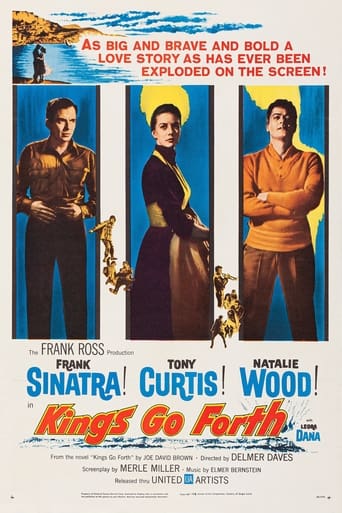MartinHafer
This film is set in Europe during WWII and concerns a couple of American soldiers who fall for the same French girl. However, while the notion of two guys falling in love with the same person isn't particularly novel, how this is handled is.The movie is narrated, at times, by Frank Sinatra and is told from the viewpoint of his character, Sam. Sam is in charge of a unit of soldier and when they are in France, he falls hard for a gorgeous French lady (Natalie Wood). Unfortunately, this is not reciprocated as although Sam is very nice, she only sees him as a friend. Unfortunately for her, however, she soon falls for Britt (Tony Curtis)...and Britt is a grade-A heel and only is interested in using this sweet girl.This is a very good film. However, you really wonder how much better it might have been if the studio had been brave and cast the black actress, Dorothy Dandridge in the lead (as they originally intended). I am NOT complaining about Miss Wood's performance...she was EXCELLENT as a French woman. But the idea of having an obvious interracial romance would have made the film much more interesting and brave. As it is, Wood is supposed to be biracial but she really doesn't look it...and the film loses some of its punch. But it's still a good film and well worth your time...just not quite what it could have been. Sinatra is great in the movie, by the way...really, really good. And, Curtis plays an excellent fast- talking heel. Well written and unforgettable.
Petri Pelkonen
It's the time of Worldwar II and the place is Southern France.Lt. Sam Loggins, a serious man, falls for Monique Blair, an American girl raised in France.Sergeant Britt Harris, who is the total opposite of him, falls for the same girl.But Monique carries a secret: her father was black.Kings Go Forth (1958) is directed by Delmer Daves.The screenplay is by Merle Miller and it's based on the novel by Joe David Brown.Frank Sinatra does great job as 1st Lt.Sam Loggins.Tony Curtis, who turned 85 two days ago on Thursday, is terrific as Cpl. Britt Harris, the man of many flaws.And he carries his flaws with pride.Natalie Wood is brilliant as Monique Blair.Leora Dana is amazing as her mother.Karl Swenson is very good as The Colonel.Also very good job by Jacques Berthe, who plays Jean-Francois Dauvah, Boy.I liked this movie I just watched on DVD, pretty much.It does a good job dealing with love, war and racial issues.It's not the brightest classic, but it has its moments.It seems like an amazing shot when Sam walks in the bar at night to have some cognac.There's a lot of intense when Sam and Britt go to the Blairs and Sam shouts "If you touch her, I'll kill you".And when those two men, that want to kill each other, are together surrounded by all those Germans.Britt gets shot, which doesn't make Sam feel happy.This is a good movie that mixes love and war.Those two often walk hand in hand.
Ithiliensranger
Frank Sinatra, Tony Curtiss, and Natalie Wood, make a good trio cast in these roles. The movie, for its day, was a good one, but I think this could be a prime one for a remake. The screenplay had all the right elements in it, but the order was tweaked to make the ending into a Hollywoodish, happier ever after story. The book by Joe David Brown (called Combat Mission) had it end in a much darker way than was acceptable for movies in 1958.It could be done correctly these days, filmed in a dark nor style in wartime of 1943-44. They only worries I would have is with the current rash of remakes hitting the theaters, it would be done sloppily and the cast would be sub par. I could see a remake done with a low/average budget using good, young, unknown actors in the roles with the emphasis put on the accuracy of the original story. Also, an average amount of CGI in the battle scenes (read no overkill), and I think a remake would redeem itself at the box office.
hbs
I like movies of this vintage, and I like Frank, Tony, and Natalie, so I liked this movie, but it's a mess. The crux of the drama seems silly these days (at least to anyone who isn't a pathetic loser), but I suppose that it was daring in its day. Also, some key actions seem grossly undermotivated, and there is no emotional coherence to the ending. I can't say anything more without mentioning things that are technically spoilers (although they are mentioned in other reviews here), so I will warn you that this review contains spoilers...............So the big dramatic moment is that Natalie Wood's father was black. When this is comes up in the scene, I really expected the Sinatra character, to whom this revelation was made, to look confused and say "So what?", but of course he didn't (he looks shocked and dismayed, although he gets over it eventually -- it's rather sick-making how the girl's mother acts as if there is some nobility in this: "You reacted like a bigot idiot, but after a week of struggle you have decided to overlook what is at most a disgusting cultural artifact, and I'm sure that the fact that my daughter looks like a young Natalie Wood has nothing to do with it.") Anyway, Natalie (who is 19) doesn't love Frank (who is 43, but looks older), so when she falls for Tony, Frank steps aside despite his great love for her. Then Tony breaks her heart by dumping her (can't marry an African American woman even if she looks like Natalie Wood), and so Frank decides to see to it that Tony dies (by going on a suicide mission with him). Tony dies, Frank loses an arm, and then comes back an visits Natalie after the war. Mom has died, Natalie is now running a school for orphans, and Frank looks at Natalie in a haunted manner while the orphans sing a song. (Frank is on his way back to LA, where he is a partner in a construction contracting firm, but has stopped to see Natalie for some reason that is never explained -- it's like a pilgrimage, but to or for what?)I can't figure out what is supposed to be going on here. Why would Frank not warn Natalie about hooking up with an aristocratic no-good from the South? Why would he kill a guy who was his friend just for jilting a woman, especially when Frank is in love with her, and after this jilt she might well be more interested? And why does the ending seem so unmotivated, random, and abrupt?Well, here's why. In the book, "Frank" doesn't know about the father, just that "Natalie" doesn't love him. He introduces N to T in the hope that it will make him (F) look better (N says that she wants to know more ordinary Americans -- F is an officer -- and so he brings his buddy T, who is a wealthy, Ivy League educated, Southern aristocrat, as a sort of joke) and is surprised when N falls for him. T asks N to marry him (perhaps for real, perhaps just for sex), and then eventually learns that N has a black father. He dumps her cruelly, and she kills herself. F kills T, more or less as in the movie, and tells the mother shortly before she dies (She comes to see him in the hospital). He is badly wounded (losing an arm, and eye, and lots of shell fragments and bullets), and feels terrible about N's death, but is also haunted with guilt about killing T.The book isn't bad. It's written in a sort of stream of consciousness, and the suicide gives F a motive for killing T (which doesn't exist in the movie, of course, and explains why he's so troubled at the end). I guess they decided that it was too much of a downer having N die (she throws herself in the ocean but is rescued), but without that the motivation for the killing and the remorse and haunting memories just don't make sense.





